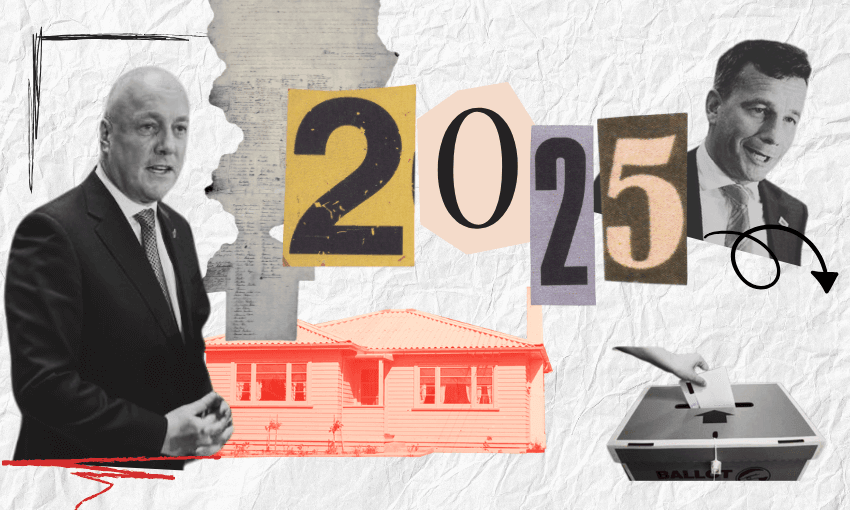To complete our series looking back at 2024 and gazing forward to 2025, we asked our big political commentary brains to nominate the three issues that will loom large in the year to come.
Madeleine Chapman (editor, The Spinoff)
- The Treaty principles bill just won’t rest, and will start the year as the Big Issue, with oral submissions being heard by select committee from the end of January. Couple that with what will surely be one of the biggest Waitangi Day turnouts in history and the mood for Māori-Crown (and Māori-Act) relations in 2025 will be set early.
- Beneficiaries and jobseekers will continue to be a big issue for the government, but it will transform into an all-consuming beast as unemployment levels continue to rise and will force a softening of approach from National in particular ahead of an election year.
- This is one that I hope won’t be an issue: gender-affirming healthcare. I think in the middle year of a parliamentary term, the likes of NZ First and Act will hopefully find something else more pressing to focus on and gender-affirming care will return to being a helpful, life-saving intervention for a very small minority of young people in New Zealand.
Eric Crampton (chief economist, The New Zealand Initiative)
- We have a structural deficit. It has to be solved. There are no painless solutions. A lot of 2025 will be downstream of that problem.
- Whether the coalition’s promises on housing growth start having tangible effect.
- Finding new and better ways of recognising and enabling rangatiratanga.
Mihingarangi Forbes (co-host, RNZ’s Mata and Saturday Morning)
- Everyone thinks it’s the Treaty principles bill but it’s probably the RMA and the incremental removal of Treaty clauses from a list of legislation.
- Health.
- Social cohesion.
Andrew Geddis (law professor, University of Otago)
- “Māori-Crown relations” – this will go beyond arguing about “the principles of the Treaty” to requiring a (re)conceptualisation of the nature of the Aotearoa New Zealand state.
- The economy, stupid – can the coalition get the rubber band bounce-back that will allow it to claim success?
- Local body elections – as important for our day-to-day lives as parliamentary ones, but maybe some two-thirds of us won’t bother taking part.
Lara Greaves (politics associate professor, University of Auckland)
- Issues around the cost of living, housing, wages, inequality, poverty, the economy, or whatever we call it.
- A continuation of the rolling feast of anti-expert, anti-technocrat stories: government announces something, experts denounce it, there are media stories, nothing changes.
- The Treaty principles bill early in the year, and then the various Treaty principles clause reviews and revisions.
Duncan Greive (founder, The Spinoff)
- The economy, stupid. The 1% quarterly GDP fall dropped like a turd in the Christmas punchbowl on December 19. The whole theory of the coalition is that they’re the parties of business, that they understand how to make lines go up. The rest of the Anglosphere is somewhere between cautiously positive and flying, while our economy is falling apart. It needs fixing, and fast.
- Chris Luxon’s leadership. He’s managed a complex coalition well, but remains profoundly unpersuasive as a communicator. That’s fine when you’re living in the aftermath of the previous government – but it’s his economy now. The theory of him is as a CEO-style PM, but a board would not tolerate this performance from their leader – nor will his caucus unless it swings around lightning fast.
- This is much more in hope than expectation – but the role of big tech in our society and economy should assume the same kind of prominence it has in Australia. It’s hard to know how much of a handbrake on growth having untaxed and unregulated companies siphoning billions out of our economy is – but it’s clearly not helping from either a revenue or employment perspective. Given the bipartisan action in Australia, and the new laws’ immense popularity, surely government or opposition picks up this sitter of an issue some time in 2025?
Toby Manhire (editor-at-large, The Spinoff)
- Health.
- Economy.
- The great DPM handover, Peters to Seymour.
Ben McKay (AAP Pacific editor)
- The economy. Chris Luxon’s whole schtick is fixing the economy and growing the pie – so if New Zealanders spend another year in the hurt locker, with unemployment on the rise and growth failing to take off, his “back on track” pledge will ring hollow. At that point, it’s not just the left that will want to see the back of Luxon, middle New Zealand will too. Labour’s economic challenge will be finding a prescription broader than a CGT.
- The Treaty principles bill. The six-month flogging of this dead horse will be painful but present opportunities for the right and left. The right’s push to “reform the Treaty” (for want of better language) will re-emerge in a different form – what will it be? For the left, can it shape and sell a version of “co-governance” (sorry again) that can win broad appeal? And who will emerge as the most powerful voice in that debate?
- And just on that… David Seymour. In the year he becomes deputy prime minister, the Act leader is the key man in the coalition because he’s the leader who most cares deeply about his policies: he’s not in politics to lead New Zealand, he’s here to change it. All eyes should be on his reform programme, and how he manages coalition tensions. The toys might exit the cot.
Stewart Sowman-Lund (Bulletin editor, The Spinoff)
- Economy/cost of living (once again).
- Unemployment.
- The aftermath of the Treaty principles bill.





